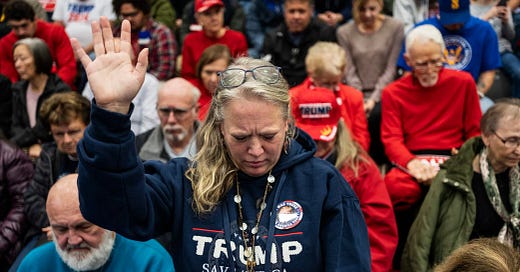Is "the different kind of evangelical voter" the new normal?
Maybe churchgoing evangelicals are destined to become the outliers after all
I’m currently preparing a review of Tim Alberta’s The Kingdom, the Power, and the Glory. One thing I appreciate about this book is its sympathetic yet frustrated approach to the state of evangelical Christianity in America. Alberta is not a schoolmarm, wagging his holier-than-though finger at the throngs of evangelicals who voted for Donald Trump in 2016 and 2020. Yes, he was raised and reared in this community of Christians, but he is not self-righteously chastising his brothers and sisters. Rather, he is troubled and saddened by what he sees as a departure from the best of the values and norms once central to the movement.
I’ll have more about this book at a later date, but I mention it now because of today’s New York Times article titled “Trump Is Connecting With a Different Type of Evangelical Voter.” It is impossible to read this reporting, from Ruth Graham and Charles Homans, without thinking of Alberta’s book and others like it, such as Jon Ward’s Testimony and Russell Moore’s Losing Our Religion. These are not critiques of Christians from the outside, scaring non-Christian readers with tales about the sinister motives of evangelical Christians wishing to turn America into a Christian Nationalist theocracy. Instead, these lamentations are coming from inside the house.
At the heart of this Times article is a relatively new phenomenon in American religion: The decline of churchgoing yet supposedly faithful Americans. Such an idea was once considered paradoxical or even nonsensical, but now, with developments in technology and a decreasing stigma of sitting out Sunday morning worship services, some people are holding onto their faith commitments—and even their evangelical Christian label—without walking through church doors on a regular basis.
Graham and Homans highlight a number of individuals emblematic of this identity, but of course anecdotes can’t tell the whole story. Thankfully, the reporters also interview researchers citing data showing the decline of institutional religious affiliation and church membership and attendance. In reading this piece, wherein the evangelical label is perhaps no longer a religious or spiritual one but a political one, I wonder whether it is really the run-of-the-mill churchgoing evangelicals who are becoming disconnected from the larger cultural landscape.
He has said this elsewhere, but political scientist Ryan Burge maintains that it is not religion that drives politics anymore; the relationship has flipped. “Politics is the master identity,” he tells the Times. “Everything else lines up behind partisanship.” Because of this, for many Christians (and even others) identifying as evangelical is not necessarily about adhering to the inerrancy of scripture or strictly believing in Christ’s atoning work on the cross. Rather, the label now carries different connotations. According to Graham and Homans,
Being evangelical once suggested regular church attendance, a focus on salvation and conversion and strongly held views on specific issues such as abortion. Today, it is as often used to describe a cultural and political identity: one in which Christians are considered a persecuted minority, traditional institutions are viewed skeptically and Mr. Trump looms large.
There is no sign that American politics will become any less polarized and culturally divisive in the years ahead. As political identity solidifies and strengthens its grip on our collective consciousness, religious identity is poised to become more malleable. If our political leaders do or demand things inconsistent with our religious commitments while we are becoming less and less grounded in deeply rooted belief systems, we are more likely to change or adjust the latter to conform to the former.
All this is to say that, in the years and decades ahead, these stories about the “different kind of evangelical voter” will become harder and harder to write. As these voters become more and more the norm, it is churchgoing, Bible-believing, “traditional” evangelicals who will appear to be the outliers. Those of us who try to adhere to the “religion-driving-politics” framework may find ourselves increasingly out of touch from our community, while trying to convince ourselves that it’s the other evangelicals who are weird.
And as we do so, we’ll increasingly resemble The Simpsons’ Principal Skinner.





Really good read. I often wonder if the term "Evangelical" will soon fail to be seen as a meaningful category at all.
Now that religion isn't driving politics, I wonder what the best way is––for believers who want it the other way around––to find strongholds and fight back.